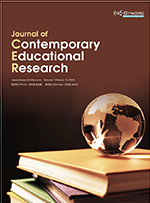Abstract
Based on Conceptual Metaphor Theory (CMT), this paper creates a tiny corpus of ChatGPT-written speeches. Through employing a corpus-driven approach, this study analyzes the identification and utilization of conceptual metaphors in artificial intelligence (AI) languages. The AI demonstrated its capacity to utilize metaphors in the metaphoric corpora through the display of diversity, non-arbitrariness, repetition, and intersectionality in the selection of source domains. It often uses vocabulary combinations with clear similarities to establish metaphorical meaning. In the literal sense, the outcomes of metaphor identification by artificial intelligence differ significantly from those of humans. Therefore, there is a need to develop advanced automatic models for identifying metaphors in order to enhance the precision of metaphor identification consistently.
References
Zhang W, Liu T, 2023, Technical Analysis of ChatGPT and Perspectives on the Development of Artificial General Intelligence. Bulletin of National Science Foundation of China, 37(5): 747–753.
George AS, George AH, 2023, A Review of ChatGPT AI’s Impact on Several Business Sectors. Partners Universal International Innovation Journal, 1(1): 9–23.
Shu D, 2000, Research on Metaphor, Shanghai Foreign Language Education Press, Shanghai.
Kovecses Z, 2018, Metaphor in Media Language and Cognition: A Perspective from Conceptual Metaphor Theory. Lege Artis, 3(1): 124–141.
Lakoff G, Johnson M, 1980, Metaphors We Live By, Chicago University Press, Chicago.
Kovecses Z, 2016, Conceptual Metaphor Theory, in The Routledge Handbook of Metaphor and Language, Routledge, London, 13–27.
Sun Y, 2019, Constructing Theoretical Paradigms of Contemporary Metaphorology, Hainan: Humanities & Social Sciences Journal of Hainan University, 37(6): 126–134.
Zhang W, 2023, Research on Metaphor and Metonymy, Foreign Language Teaching and Research Press, Beijing, 5.
Steen GJ, 2010, A Method for Linguistic Metaphor Identification, John Benjamins Publishing Company, Amsterdam.
Lakoff G, 1993, The Contemporary Theory of Metaphor, Metaphor and Thought, Cambridge University Press, Cambridge, 202.
Charteris-Black J, 2004, Corpus Approaches to Critical Metaphor Analysis, Palgrave Macmillan, New York, 89.
